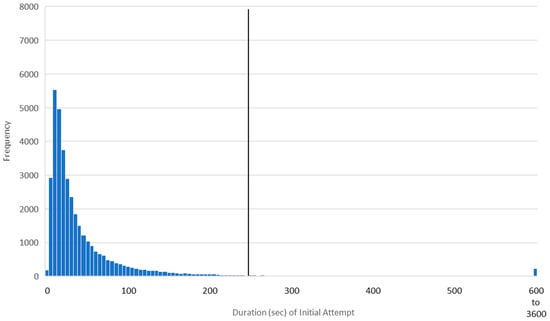-
 Conditional Dependence across Slow and Fast Item Responses: With a Latent Space Item Response Modeling Approach
Conditional Dependence across Slow and Fast Item Responses: With a Latent Space Item Response Modeling Approach -
 Why Do Bi-Factor Models Outperform Higher-Order g Factor Models? A Network Perspective
Why Do Bi-Factor Models Outperform Higher-Order g Factor Models? A Network Perspective -
 Cognitive Foundations of Early Mathematics: Investigating the Unique Contributions of Numerical, Executive Function, and Spatial Skills
Cognitive Foundations of Early Mathematics: Investigating the Unique Contributions of Numerical, Executive Function, and Spatial Skills -
 Cultural Intelligence Deployed in One’s Own vs. in a Different Culture: The Same or Different?
Cultural Intelligence Deployed in One’s Own vs. in a Different Culture: The Same or Different?
Journal Description
Journal of Intelligence
Journal of Intelligence
is an international, peer-reviewed, open access journal on the study of human intelligence, published monthly online by MDPI.
- Open Access— free for readers, with article processing charges (APC) paid by authors or their institutions.
- High Visibility: indexed within Scopus, SSCI (Web of Science), PubMed, PMC, PsycInfo, PSYNDEX, and other databases.
- Journal Rank: JCR - Q2 (Psychology, Multidisciplinary) / CiteScore - Q2 (Education)
- Rapid Publication: manuscripts are peer-reviewed and a first decision is provided to authors approximately 32.8 days after submission; acceptance to publication is undertaken in 4.6 days (median values for papers published in this journal in the second half of 2023).
- Recognition of Reviewers: reviewers who provide timely, thorough peer-review reports receive vouchers entitling them to a discount on the APC of their next publication in any MDPI journal, in appreciation of the work done.
Impact Factor:
3.5 (2022)
Latest Articles
Metacognitive Management of Attention in Online Learning
J. Intell. 2024, 12(4), 46; https://0-doi-org.brum.beds.ac.uk/10.3390/jintelligence12040046 - 22 Apr 2024
Abstract
Performance during training is a poor predictor of long-term retention. Worse yet, conditions of training that produce rapidly improving performance typically do not produce long-lasting, generalizable learning. As a result, learners and instructors alike can be misled into adopting training or educational experiences
[...] Read more.
Performance during training is a poor predictor of long-term retention. Worse yet, conditions of training that produce rapidly improving performance typically do not produce long-lasting, generalizable learning. As a result, learners and instructors alike can be misled into adopting training or educational experiences that are suboptimal for producing actual learning. Computer-based educational training platforms can counter this unfortunate tendency by providing only productive conditions of instruction—even if they are unintuitive (e.g., spacing instead of massing). The use of such platforms, however, introduces a different liability: being easy to interrupt. An assessment of this possible liability is needed given the enormous disruption to modern education brought about by COVID-19 and the subsequent widespread emergency adoption of computer-based remote instruction. The present study was therefore designed to (a) explore approaches for detecting interruptions that can be reasonably implemented by an instructor, (b) determine the frequency at which students are interrupted during a cognitive-science-based digital learning experience, and (c) establish the extent to which the pandemic and ensuing lockdowns affected students’ metacognitive ability to maintain engagement with their digital learning experiences. Outliers in time data were analyzed with increasing complexity and decreasing subjectivity to identify when learners were interrupted. Results indicated that only between 1.565% and 3.206% of online interactions show evidence of learner interruption. And although classroom learning was inarguably disrupted by the pandemic, learning in the present, evidence-based platform appeared to be immune.
Full article
(This article belongs to the Special Issue The Intersection of Metacognition and Intelligence)
►
Show Figures
Open AccessArticle
Contextualizing Positionality, Intersectionality, and Intelligence in the Anthropocene
by
Lisa A. Suzuki, Taymy J. Caso, Aysegul Yucel, Ahad Asad and Haruka Kokaze
J. Intell. 2024, 12(4), 45; https://0-doi-org.brum.beds.ac.uk/10.3390/jintelligence12040045 - 17 Apr 2024
Abstract
The geological epoch of the Anthropocene has challenged traditional definitions of what intellectual abilities are necessary to creatively problem-solve, understand, and address contemporary societal and environmental crises. If we hope to make meaningful changes to how our society addresses these complex issues and
[...] Read more.
The geological epoch of the Anthropocene has challenged traditional definitions of what intellectual abilities are necessary to creatively problem-solve, understand, and address contemporary societal and environmental crises. If we hope to make meaningful changes to how our society addresses these complex issues and pave the way for a better future for generations to come, we must advance traditional theories and measures of higher-order abilities to reflect equity and inclusion. To this end, we must address global issues by integrating the complexities of intersectional identities as they impact our understanding of what constitutes intelligence in individuals, groups, and diverse communities. This re-envisioning of intelligence presents new complexities for understanding and challenges for our field beyond the boundaries of what has been previously touted by many disciplines, including psychology. It is an opportunity to re-envision what it means to be intelligent in a diverse global context while also honoring and recognizing the value of difference, positionality, and other ways of knowing.
Full article
(This article belongs to the Special Issue Understanding Higher-Order Cognitive Abilities and Their Development in the Anthropocene)
Open AccessArticle
Judgments of Learning Reactively Improve Memory by Enhancing Learning Engagement and Inducing Elaborative Processing: Evidence from an EEG Study
by
Baike Li, Bernhard Pastötter, Yongen Zhong, Ningxin Su, Ting Huang, Wenbo Zhao, Xiao Hu, Liang Luo and Chunliang Yang
J. Intell. 2024, 12(4), 44; https://0-doi-org.brum.beds.ac.uk/10.3390/jintelligence12040044 - 09 Apr 2024
Abstract
►▼
Show Figures
Making judgments of learning (JOLs) can reactively alter memory itself, a phenomenon termed the reactivity effect. The current study recorded electroencephalography (EEG) signals during the encoding phase of a word list learning task to explore the neurocognitive features associated with JOL reactivity. The
[...] Read more.
Making judgments of learning (JOLs) can reactively alter memory itself, a phenomenon termed the reactivity effect. The current study recorded electroencephalography (EEG) signals during the encoding phase of a word list learning task to explore the neurocognitive features associated with JOL reactivity. The behavioral results show that making JOLs reactively enhances recognition performance. The EEG results reveal that, compared with not making JOLs, making JOLs increases P200 and LPC amplitudes and decreases alpha and beta power. Additionally, the signals of event-related potentials (ERPs) and event-related desynchronizations (ERDs) partially mediate the reactivity effect. These findings support the enhanced learning engagement theory and the elaborative processing explanation to account for the JOL reactivity effect.
Full article
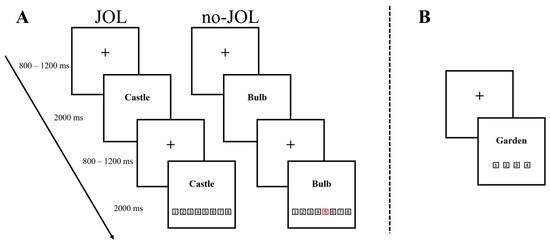
Figure 1
Open AccessArticle
Applying the Discrepancy Consistency Method on CAS-2: Brief Data in a Sample of Greek-Speaking Children
by
George K. Georgiou, Sergios C. Sergiou and Charalambos Y. Charalambous
J. Intell. 2024, 12(4), 43; https://0-doi-org.brum.beds.ac.uk/10.3390/jintelligence12040043 - 05 Apr 2024
Abstract
This study aimed to examine whether we could use the discrepancy consistency method on CAS-2: Brief data collected in Cyprus. A total of 438 Grade 6 children (201 boys, 237 girls, Mage = 135.75 months, SD = 4.05 months) from Cyprus were
[...] Read more.
This study aimed to examine whether we could use the discrepancy consistency method on CAS-2: Brief data collected in Cyprus. A total of 438 Grade 6 children (201 boys, 237 girls, Mage = 135.75 months, SD = 4.05 months) from Cyprus were assessed on the Cognitive Assessment System-2: Brief that is used to operationalize four neurocognitive processes, namely Planning, Attention, Simultaneous, and Successive (PASS) processing. They were also assessed on two measures of reading (Wordchains and CBM-Maze) and mathematics (Mathematics Achievement Test and Mathematics Reasoning Test). The results showed that 31.5% of our sample had a PASS disorder, and 8% to 10% of our sample had both a PASS disorder and an academic disorder. These numbers are similar to those reported in previous studies that used DCM in North America and suggest that the method can be used to inform instruction, particularly in places where no screening for learning disabilities is available.
Full article
(This article belongs to the Special Issue Neurocognitive Processes: Measurement, Connections to Academic Achievement and Clinical Applications)
►▼
Show Figures
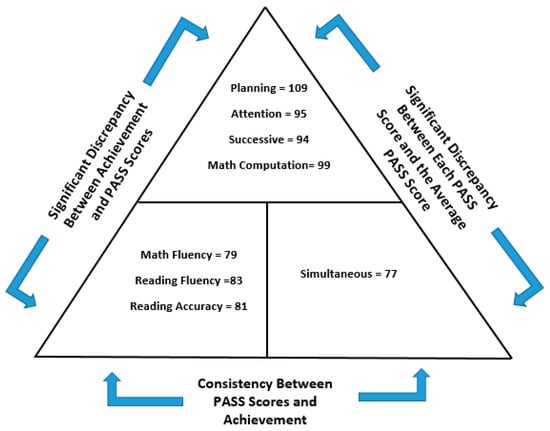
Figure 1
Open AccessArticle
Stimulus Complexity Can Enhance Art Appreciation: Phenomenological and Psychophysiological Evidence for the Pleasure-Interest Model of Aesthetic Liking
by
Tammy-Ann Husselman, Edson Filho, Luca W. Zugic, Emma Threadgold and Linden J. Ball
J. Intell. 2024, 12(4), 42; https://0-doi-org.brum.beds.ac.uk/10.3390/jintelligence12040042 - 03 Apr 2024
Abstract
We tested predictions deriving from the “Pleasure-Interest Model of Aesthetic Liking” (PIA Model), whereby aesthetic preferences arise from two fluency-based processes: an initial automatic, percept-driven default process and a subsequent perceiver-driven reflective process. One key trigger for reflective processing is stimulus complexity. Moreover,
[...] Read more.
We tested predictions deriving from the “Pleasure-Interest Model of Aesthetic Liking” (PIA Model), whereby aesthetic preferences arise from two fluency-based processes: an initial automatic, percept-driven default process and a subsequent perceiver-driven reflective process. One key trigger for reflective processing is stimulus complexity. Moreover, if meaning can be derived from such complexity, then this can engender increased interest and elevated liking. Experiment 1 involved graffiti street-art images, pre-normed to elicit low, moderate and high levels of interest. Subjective reports indicated a predicted enhancement in liking across increasing interest levels. Electroencephalography (EEG) recordings during image viewing revealed different patterns of alpha power in temporal brain regions across interest levels. Experiment 2 enforced a brief initial image-viewing stage and a subsequent reflective image-viewing stage. Differences in alpha power arose in most EEG channels between the initial and deliberative viewing stages. A linear increase in aesthetic liking was again seen across interest levels, with different patterns of alpha activity in temporal and occipital regions across these levels. Overall, the phenomenological data support the PIA Model, while the physiological data suggest that enhanced aesthetic liking might be associated with “flow-feelings” indexed by alpha activity in brain regions linked to visual attention and reducing distraction.
Full article
(This article belongs to the Special Issue Grounding Cognition in Perceptual Experience)
►▼
Show Figures

Figure 1
Open AccessArticle
The Development of Cognitive Control in Preschoolers and Kindergarteners: The Case of Post-Error Slowing and Delayed Disinhibition
by
Maor Yeshua and Andrea Berger
J. Intell. 2024, 12(4), 41; https://0-doi-org.brum.beds.ac.uk/10.3390/jintelligence12040041 - 01 Apr 2024
Abstract
This study aimed to investigate two specific behavioral manifestations of the executive attention systems in preschoolers and kindergarteners, beyond the unique contribution of intelligence. We tested post-error slowing [
[...] Read more.
This study aimed to investigate two specific behavioral manifestations of the executive attention systems in preschoolers and kindergarteners, beyond the unique contribution of intelligence. We tested post-error slowing [
(This article belongs to the Special Issue On the Origins and Development of Attention Networks)
►▼
Show Figures
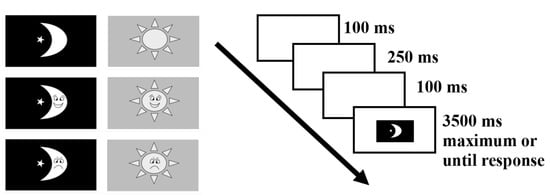
Figure 1
Open AccessArticle
Psychometric Modeling to Identify Examinees’ Strategy Differences during Testing
by
Clifford E. Hauenstein, Susan E. Embretson and Eunbee Kim
J. Intell. 2024, 12(4), 40; https://0-doi-org.brum.beds.ac.uk/10.3390/jintelligence12040040 - 29 Mar 2024
Abstract
Aptitude test scores are typically interpreted similarly for examinees with the same overall score. However, research has found evidence of examinee differences in strategies, as well as in the continued application of appropriate procedures during testing. Such differences can impact the correlates of
[...] Read more.
Aptitude test scores are typically interpreted similarly for examinees with the same overall score. However, research has found evidence of examinee differences in strategies, as well as in the continued application of appropriate procedures during testing. Such differences can impact the correlates of test scores, making similar interpretations for equivalent scores questionable. This study presents some item response theory (IRT) models that are relevant to identifying examinee differences in strategies and understanding of test-taking procedures. First, mixture IRT models that identify latent classes of examinees with different patterns of item responses are considered; these models have long been available but unfortunately are not routinely applied. Strategy differences between the classes can then be studied separately by modeling the response patterns with cognitive complexity variables within each class. Secondly, novel psychometric approaches that leverage response time information (in particular, response time residuals) in order to identify both inter and intraindividual variability in response processes are considered. In doing so, a general method for evaluating threats to validity is proposed. The utility of the approach, in terms of providing more interpretable performance estimates and improving the administration of psychological measurement instruments, is then demonstrated with an empirical example.
Full article
(This article belongs to the Topic Psychometric Methods: Theory and Practice)
►▼
Show Figures

Figure 1
Open AccessReview
Sex Differences in Cognitive Reflection: A Meta-Analysis
by
Inmaculada Otero, Alexandra Martínez, Dámaris Cuadrado, Mario Lado, Silvia Moscoso and Jesús F. Salgado
J. Intell. 2024, 12(4), 39; https://0-doi-org.brum.beds.ac.uk/10.3390/jintelligence12040039 - 29 Mar 2024
Abstract
►▼
Show Figures
The current study presents a meta-analytic review of the differences between men and women in cognitive reflection (CR). The study also explores whether the type of CR test (i.e., numerical tests and verbal tests) moderates the relationship between CR and sex. The results
[...] Read more.
The current study presents a meta-analytic review of the differences between men and women in cognitive reflection (CR). The study also explores whether the type of CR test (i.e., numerical tests and verbal tests) moderates the relationship between CR and sex. The results showed that men score higher than women on CR, although the magnitude of these differences was small. We also found out that the type of CR test moderates the sex differences in CR, especially in the numerical tests. In addition, the results showed that the length of numerical tests (i.e., number of items) does not affect the differences between men and women in CR. Finally, the implications of these results are discussed, and future research is suggested.
Full article

Figure 1
Open AccessArticle
A Recent Development of a Network Approach to Assessment Data: Latent Space Item Response Modeling for Intelligence Studies
by
Inhan Kang and Minjeong Jeon
J. Intell. 2024, 12(4), 38; https://0-doi-org.brum.beds.ac.uk/10.3390/jintelligence12040038 - 28 Mar 2024
Abstract
►▼
Show Figures
This article aims to provide an overview of the potential advantages and utilities of the recently proposed Latent Space Item Response Model (LSIRM) in the context of intelligence studies. The LSIRM integrates the traditional Rasch IRT model for psychometric data with the latent
[...] Read more.
This article aims to provide an overview of the potential advantages and utilities of the recently proposed Latent Space Item Response Model (LSIRM) in the context of intelligence studies. The LSIRM integrates the traditional Rasch IRT model for psychometric data with the latent space model for network data. The model has person-wise latent abilities and item difficulty parameters, capturing the main person and item effects, akin to the Rasch model. However, it additionally assumes that persons and items can be mapped onto the same metric space called a latent space and distances between persons and items represent further decreases in response accuracy uncaptured by the main model parameters. In this way, the model can account for conditional dependence or interactions between persons and items unexplained by the Rasch model. With two empirical datasets, we illustrate that (1) the latent space can provide information on respondents and items that cannot be captured by the Rasch model, (2) the LSIRM can quantify and visualize potential between-person variations in item difficulty, (3) latent dimensions/clusters of persons and items can be detected or extracted based on their latent positions on the map, and (4) personalized feedback can be generated from person-item distances. We conclude with discussions related to the latent space modeling integrated with other psychometric models and potential future directions.
Full article
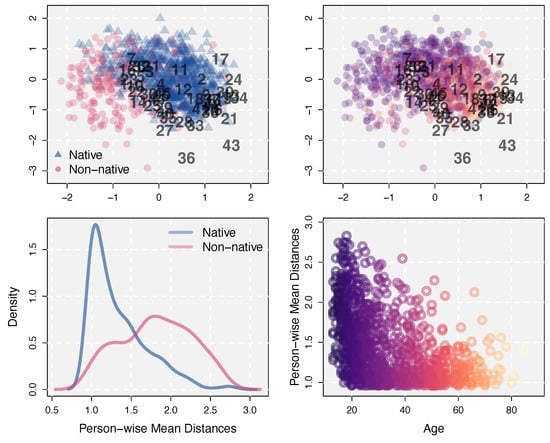
Figure 1
Open AccessArticle
Examining the Existence of Cognitive Thresholds in Highly Quantitative College Courses
by
You Zhou, Nathan R. Kuncel and Paul R. Sackett
J. Intell. 2024, 12(4), 37; https://0-doi-org.brum.beds.ac.uk/10.3390/jintelligence12040037 - 26 Mar 2024
Abstract
►▼
Show Figures
While the dominant finding indicates a monotonic relationship between cognitive ability and academic performance, some researchers have suggested the existence of cognitive thresholds for challenging coursework, such that a certain level of cognitive ability is required for reaching a satisfactory level of academic
[...] Read more.
While the dominant finding indicates a monotonic relationship between cognitive ability and academic performance, some researchers have suggested the existence of cognitive thresholds for challenging coursework, such that a certain level of cognitive ability is required for reaching a satisfactory level of academic achievement. Given the significance of finding a threshold for understanding the relationship between cognitive ability and academic performance, and the limited studies on the topic, it is worth further investigating the possibility of cognitive thresholds. Using a multi-institutional dataset and the necessary condition analysis (NCA), we attempted to replicate previous findings of cognitive thresholds on the major GPA of mathematics and physics-majored students, as well as the course grade of organic chemistry, to examine whether high SAT math scores constitute a necessary condition for obtaining satisfactory grades in these courses. The results from the two studies do not indicate an absolute cognitive threshold point below which students are doomed to fail regardless of the amount of effort they devote into learning. However, we did find that the chance of students with a low level of quantitative ability to succeed in highly quantitative courses is very small, which qualifies for the virtually necessary condition.
Full article
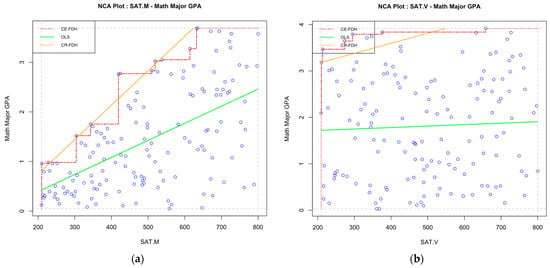
Figure 1
Open AccessCommentary
How Can the Current State of AI Guide Future Conversations of General Intelligence?
by
Tomoe Kanaya and Ali Magine
J. Intell. 2024, 12(3), 36; https://0-doi-org.brum.beds.ac.uk/10.3390/jintelligence12030036 - 20 Mar 2024
Abstract
Similar to the field of human intelligence, artificial intelligence (AI) has experienced a long history of advances and controversies regarding its definition, assessment, and application. Starting over 70 years ago, AI set out to achieve a single, general-purpose technology that could overcome many
[...] Read more.
Similar to the field of human intelligence, artificial intelligence (AI) has experienced a long history of advances and controversies regarding its definition, assessment, and application. Starting over 70 years ago, AI set out to achieve a single, general-purpose technology that could overcome many tasks in a similar fashion to humans. However, until recently, implementations were based on narrowly defined tasks, making the systems inapplicable to even slight variations of the same task. With recent advances towards more generality, the contemplation of artificial general intelligence (AGI) akin to human general intelligence (HGI) can no longer be easily dismissed. We follow this line of inquiry and outline some of the key questions and conceptual challenges that must be addressed in order to integrate AGI and HGI and to enable future progress towards a unified field of general intelligence.
Full article
Open AccessEditorial
The Six Challenges for Personality, Intelligence, Cognitive Skills, and Life Outcomes Research: An Introduction to the Special Issue
by
Konrad Kulikowski and Yoav Ganzach
J. Intell. 2024, 12(3), 35; https://0-doi-org.brum.beds.ac.uk/10.3390/jintelligence12030035 - 18 Mar 2024
Abstract
Understanding how personality [...]
Full article
(This article belongs to the Topic Personality, Intelligence, Cognitive Skills, and Life Outcomes)
Open AccessArticle
How Cognitive Ability Shapes Personality Differentiation in Real Job Candidates: Insights from a Large-Scale Study
by
Alina N. Stamate, Pascale L. Denis and Geneviève Sauvé
J. Intell. 2024, 12(3), 34; https://0-doi-org.brum.beds.ac.uk/10.3390/jintelligence12030034 - 16 Mar 2024
Abstract
The differentiation of personality by the cognitive ability hypothesis proposes that individuals with higher cognitive ability have more variability in their personality structure than those with lower cognitive ability. A large sample of actual job candidates (n = 14,462) who participated in
[...] Read more.
The differentiation of personality by the cognitive ability hypothesis proposes that individuals with higher cognitive ability have more variability in their personality structure than those with lower cognitive ability. A large sample of actual job candidates (n = 14,462) who participated in an online proctored test session, providing socio-demographic information and completing cognitive ability, personality, and language proficiency assessments, was used to test this hypothesis. The total sample was divided into three equal groups (low, average, high) using percentiles as the cutoff point to investigate the effects of cognitive ability. An ANCOVA demonstrated the significant effect of cognitive ability on personality traits, controlling for language proficiency. Principal component analyses showed that the personality structure differed between the cognitive ability groups, with the high-cognitive-ability group having an additional personality component. Similarly, analyses across job complexity levels indicated more personality components for high-job-complexity positions. The implications, limitations, and future directions of this study are discussed.
Full article
Open AccessArticle
Deductive Reasoning Skills in Children Aged 4–8 Years Old
by
Krisztián Józsa, Tun Zaw Oo, Diana Borbélyová and Judit Podráczky
J. Intell. 2024, 12(3), 33; https://0-doi-org.brum.beds.ac.uk/10.3390/jintelligence12030033 - 12 Mar 2024
Abstract
►▼
Show Figures
Young children possess the fundamental deductive reasoning skills for solving their upcoming problems in their daily lives. These skills are of great importance for their school readiness and academic development. Therefore, this study aimed to explore the age differences and predictive variables of
[...] Read more.
Young children possess the fundamental deductive reasoning skills for solving their upcoming problems in their daily lives. These skills are of great importance for their school readiness and academic development. Therefore, this study aimed to explore the age differences and predictive variables of deductive reasoning skills in young Hungarian children aged 4–8 years old who reside in Hungary and Slovakia. Face-to-face data were collected from 3050 participants. The instrument of deductive reasoning skills assessment was extracted from the school readiness test, DIFER (Diagnostic System for Assessing Development). Utilizing various statistical analyses with R, AMOS, and MPlus8 packages, it was found that there were significant differences in young children’s deductive reasoning skills across countries and age groups. Parents’ education levels had significant positive relationships with children’s deductive reasoning skills development. And the variables of country and age were identified as significant predictors of children’s deductive reasoning skills. And children’s family background variables such as parental education played a significant role in predicting children’s deductive reasoning skills in Hungary. The implications of this study emphasize the importance of educational contexts, parental involvement, cross-cultural exchange, and further research, with the potential to enhance young children’s educational experiences and prospects in Hungary, Slovakia, and beyond.
Full article

Figure 1
Open AccessArticle
Explanatory Cognitive Diagnosis Models Incorporating Item Features
by
Manqian Liao, Hong Jiao and Qiwei He
J. Intell. 2024, 12(3), 32; https://0-doi-org.brum.beds.ac.uk/10.3390/jintelligence12030032 - 11 Mar 2024
Abstract
Item quality is crucial to psychometric analyses for cognitive diagnosis. In cognitive diagnosis models (CDMs), item quality is often quantified in terms of item parameters (e.g., guessing and slipping parameters). Calibrating the item parameters with only item response data, as a common practice,
[...] Read more.
Item quality is crucial to psychometric analyses for cognitive diagnosis. In cognitive diagnosis models (CDMs), item quality is often quantified in terms of item parameters (e.g., guessing and slipping parameters). Calibrating the item parameters with only item response data, as a common practice, could result in challenges in identifying the cause of low-quality items (e.g., the correct answer is easy to be guessed) or devising an effective plan to improve the item quality. To resolve these challenges, we propose the item explanatory CDMs where the CDM item parameters are explained with item features such that item features can serve as an additional source of information for item parameters. The utility of the proposed models is demonstrated with the Trends in International Mathematics and Science Study (TIMSS)-released items and response data: around 20 item linguistic features were extracted from the item stem with natural language processing techniques, and the item feature engineering process is elaborated in the paper. The proposed models are used to examine the relationships between the guessing/slipping item parameters of the higher-order DINA model and eight of the item features. The findings from a follow-up simulation study are presented, which corroborate the validity of the inferences drawn from the empirical data analysis. Finally, future research directions are discussed.
Full article
(This article belongs to the Topic Psychometric Methods: Theory and Practice)
►▼
Show Figures
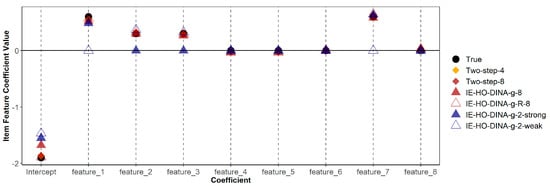
Figure 1
Open AccessEditorial
Psycho-Educational Assessments: Theory and Practice
by
Okan Bulut
J. Intell. 2024, 12(3), 31; https://0-doi-org.brum.beds.ac.uk/10.3390/jintelligence12030031 - 05 Mar 2024
Abstract
Psycho-educational assessments, such as intelligence tests, cognitive test batteries, and behavioral measures, serve as invaluable tools for school psychologists and educators [...]
Full article
(This article belongs to the Special Issue Psycho-Educational Assessments: Theory and Practice)
Open AccessArticle
Examining the Interplay between the Cognitive and Emotional Aspects of Gender Differences in Spatial Processing
by
Cynthia M. Fioriti, Raeanne N. Martell, Richard J. Daker, Eleanor P. Malone, H. Moriah Sokolowski, Adam E. Green, Susan C. Levine, Erin A. Maloney, Gerardo Ramirez and Ian M. Lyons
J. Intell. 2024, 12(3), 30; https://0-doi-org.brum.beds.ac.uk/10.3390/jintelligence12030030 - 04 Mar 2024
Abstract
Women reliably perform worse than men on measures of spatial ability, particularly those involving mental rotation. At the same time, females also report higher levels of spatial anxiety than males. What remains unclear, however, is whether and in what ways gender differences in
[...] Read more.
Women reliably perform worse than men on measures of spatial ability, particularly those involving mental rotation. At the same time, females also report higher levels of spatial anxiety than males. What remains unclear, however, is whether and in what ways gender differences in these cognitive and affective aspects of spatial processing may be interrelated. Here, we tested for robust gender differences across six different datasets in spatial ability and spatial anxiety (N = 1257, 830 females). Further, we tested for bidirectional mediation effects. We identified indirect relations between gender and spatial skills through spatial anxiety, as well as between gender and spatial anxiety through spatial skills. In the gender → spatial anxiety → spatial ability direction, spatial anxiety explained an average of 22.4% of gender differences in spatial ability. In the gender → spatial ability → spatial anxiety direction, spatial ability explained an average of 25.9% of gender differences in spatial anxiety. Broadly, these results support a strong relation between cognitive and affective factors when explaining gender differences in the spatial domain. However, the nature of this relation may be more complex than has been assumed in previous literature. On a practical level, the results of this study caution the development of interventions to address gender differences in spatial processing which focus primarily on either spatial anxiety or spatial ability until such further research can be conducted. Our results also speak to the need for future longitudinal work to determine the precise mechanisms linking cognitive and affective factors in spatial processing.
Full article
(This article belongs to the Special Issue Spatial Intelligence and Learning)
►▼
Show Figures

Figure 1
Open AccessArticle
Adding a Piece to the Puzzle? The Allocation of Figurative Language Comprehension into the CHC Model of Cognitive Abilities
by
Andra Biesok, Matthias Ziegler, Christiane Montag and Ivan Nenchev
J. Intell. 2024, 12(3), 29; https://0-doi-org.brum.beds.ac.uk/10.3390/jintelligence12030029 - 01 Mar 2024
Abstract
The study aimed to investigate the allocation of figurative language comprehension (FLC) within the Cattell–Horn–Carroll (CHC) model of cognitive abilities, using three newly developed tests: the Reverse Paraphrase Test (RPT), the Literal Paraphrase Test (LPT), and the Proverb Test (PT). The analysis of
[...] Read more.
The study aimed to investigate the allocation of figurative language comprehension (FLC) within the Cattell–Horn–Carroll (CHC) model of cognitive abilities, using three newly developed tests: the Reverse Paraphrase Test (RPT), the Literal Paraphrase Test (LPT), and the Proverb Test (PT). The analysis of a sample of 909 participants revealed that the RPT and LPT measured a unidimensional construct of FLC, while the PT was excluded due to insufficient fit. Combining RPT and LPT items, various models were evaluated, with a bifactor S-1 model showing the best fit, indicating the influence of a general factor (representing FLC) and test-specific method factors. The study explored FLC allocation within the CHC model, supporting its consideration as a distinct factor under the g factor. Examining the nomological network, significant correlations emerged between the Intellectual Curiosity and Aesthetic Sensitivity facets of Openness and FLC, which were comparable in size to the relation with general ability. In conclusion, the study enhances the understanding of FLC within the CHC model, advocating its recognition as a distinct factor. Correlations with Openness facets suggest valuable insights into the interplay between cognitive abilities and personality, necessitating further research for a deeper exploration of this relation.
Full article
(This article belongs to the Special Issue Personality and Individual Differences)
►▼
Show Figures

Figure 1
Open AccessArticle
Progressing the Development of a Collaborative Metareasoning Framework: Prospects and Challenges
by
Beth H. Richardson and Linden J. Ball
J. Intell. 2024, 12(3), 28; https://0-doi-org.brum.beds.ac.uk/10.3390/jintelligence12030028 - 01 Mar 2024
Cited by 1
Abstract
Metareasoning refers to processes that monitor and control ongoing thinking and reasoning. The “metareasoning framework” that was established in the literature in 2017 has been useful in explaining how monitoring processes during reasoning are sensitive to an individual’s fluctuating feelings of certainty and
[...] Read more.
Metareasoning refers to processes that monitor and control ongoing thinking and reasoning. The “metareasoning framework” that was established in the literature in 2017 has been useful in explaining how monitoring processes during reasoning are sensitive to an individual’s fluctuating feelings of certainty and uncertainty. The framework was developed to capture metareasoning at an individual level. It does not capture metareasoning during collaborative activities. We argue this is significant, given the many domains in which team-based reasoning is critical, including design, innovation, process control, defence and security. Currently, there is no conceptual framework that addresses the nature of collaborative metareasoning in these kinds of domains. We advance a framework of collaborative metareasoning that develops an understanding of how teams respond to the demands and opportunities of the task at hand, as well as to the demands and opportunities afforded by interlocuters who have different perspectives, knowledge, skills and experiences. We point to the importance of a tripartite distinction between “self-monitoring”, “other monitoring” and “joint monitoring”. We also highlight a parallel distinction between “self-focused control”, “other-focused control” and “joint control”. In elaborating upon these distinctions, we discuss the prospects for developing a comprehensive collaborative metareasoning framework with a unique focus on language as a measure of both uncertainty and misalignment.
Full article
(This article belongs to the Special Issue Metareasoning: Theoretical and Methodological Developments)
►▼
Show Figures
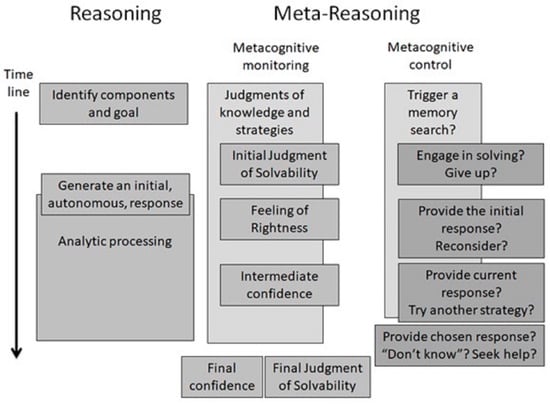
Figure 1
Open AccessArticle
“Show Me What You Got”: The Nomological Network of the Ability to Pose Facial Emotion Expressions
by
Mattis Geiger, Sally Gayle Olderbak and Oliver Wilhelm
J. Intell. 2024, 12(3), 27; https://0-doi-org.brum.beds.ac.uk/10.3390/jintelligence12030027 - 26 Feb 2024
Cited by 1
Abstract
►▼
Show Figures
Just as receptive emotional abilities, productive emotional abilities are essential for social communication. Although individual differences in receptive emotional abilities, such as perceiving and recognizing emotions, are well-investigated, individual differences in productive emotional abilities, such as the ability to express emotions in the
[...] Read more.
Just as receptive emotional abilities, productive emotional abilities are essential for social communication. Although individual differences in receptive emotional abilities, such as perceiving and recognizing emotions, are well-investigated, individual differences in productive emotional abilities, such as the ability to express emotions in the face, are largely neglected. Consequently, little is known about how emotion expression abilities fit in a nomological network of related abilities and typical behavior. We developed a multitask battery for measuring the ability to pose emotional expressions scored with facial expression recognition software. With three multivariate studies (n1 = 237; n2 = 141; n3 = 123), we test competing measurement models of emotion posing and relate this construct with other socio-emotional traits and cognitive abilities. We replicate the measurement model that includes a general factor of emotion posing, a nested task-specific factor, and emotion-specific factors. The emotion-posing ability factor is moderately to strongly related to receptive socio-emotional abilities, weakly related to general cognitive abilities, and weakly related to extraversion. This is strong evidence that emotion posing is a cognitive interpersonal ability. This new understanding of abilities in emotion communication opens a gateway for studying individual differences in social interaction.
Full article

Figure 1
Highly Accessed Articles
Latest Books
E-Mail Alert
News
Topics
Topic in
Education Sciences, J. Intell., Languages, Social Sciences, Societies
Social Sciences and Intelligence Management
Topic Editors: Liza Lee, Kuei-Kuei Lai, Linda Pavitola, Kate Chen, Teen-Hang MeenDeadline: 31 May 2024

Conferences
Special Issues
Special Issue in
J. Intell.
Cognitive Ability Testing in the Workplace: Modern Approaches and Methods
Guest Editors: Charles Scherbaum, Harold Goldstein, Annie Kato, Yuliya ChebanDeadline: 31 May 2024
Special Issue in
J. Intell.
Cognitive Motivation
Guest Editors: Anja Strobel, Alexander StrobelDeadline: 30 June 2024
Special Issue in
J. Intell.
Green Mind and Sustainable Actions: Exploring Cognitive, Personality, and Emotional Underpinnings of Pro-environmental Behaviours
Guest Editors: Marco Giancola, Simonetta D’AmicoDeadline: 20 July 2024
Special Issue in
J. Intell.
Skill Acquisition, Expertise, and Achievement
Guest Editor: Alexander P. BurgoyneDeadline: 31 August 2024




